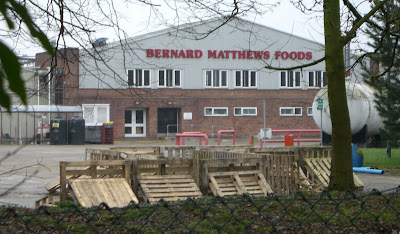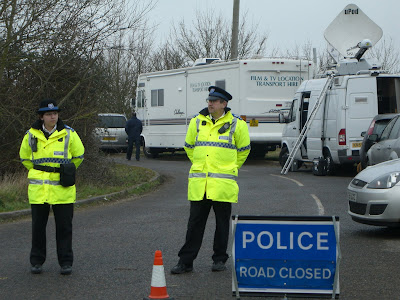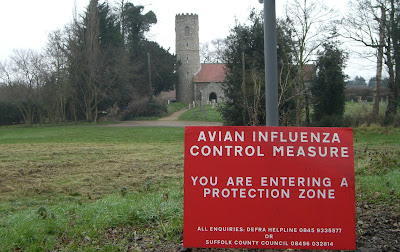I am a camera - avian flu H5N1

The photographs here were all taken by me a few hours ago at the scene of the first ever outbreak in Britain of the potentialy deadly H5N1 strain of bird flu. The outbreak, which was announced yesterday, happened in East Anglia at the Bernard Matthews turkey farm at Holton, in Suffolk, The farm is shown in my photograph below. All 160,000 birds there are being slaughtered, and an exclusion zone of two miles has been set up around the farm.

Holton is a tiny picturesque village six miles inland from the fashionable seaside town of Southwold, and close to the Suffolk coast made famous by Benjamin Britten. The farm where the outbreak occured is on a plateau above the village, and is built on a disused World War 2 airfield. This airbase was the home of the 56th Fighter Group, or as they became known, "The Wolfpack", one of the most famous USAAF fighter units in World War 2.

The first UK outbreak of the potentially deadly bird flu virus is major news, and the world's media have descended en masse on this remote area of rural Suffolk, as my two photographs here show.

Poultry farming is a major industry in the region. In my photograph above the modern and enclosed rearing sheds on the Bernard Matthews site can be seen, in the background, behind the assembled world media who are broadcasting from the scene via satellite links. The media presence is huge because the H5N1 virus is reported to have jumped to humans in Vietnam and Thailand with fatal results. For the past two years Britain has been stockpiling the anti-viral drug Tamiflu. Bernard Matthews' sites have previously been the centre of protests about poultry farming on an industrial scale. There are 22 turkey sheds at Holton, and the photograph below shows protesters there today.

United Nations co-ordinator for bird flu David Nabarro has said the presence of the disease in the UK is inevitable as it is "going to be in bird populations for several years to come. The way in which we'll deal with it is by implementing the well-rehearsed plan, which is to stamp it out at source. We've got to learn to accept that, not see it as a serious problem and just get on with normal poultry-rearing and consumption." The virus has killed 164 people since 2003, mainly in South-East Asia. So far, all those who have been infected worldwide have come into close contact with infected birds.
The UN may not see the H5N1 "as a serious problem". But I suspect the residents and workers in the tiny village of Holton, which is shown in my final photograph below, will have a different view today.

All photographs (c) On An Overgrown Path 2007.
Now read how another viral pandemic decimated Europe and killed a great musician.
Any copyrighted material on these pages is included as "fair use", for the purpose of study, review or critical analysis only, and will be removed at the request of copyright owner(s). Report broken links, missing images and other errors to - overgrownpath at hotmail dot co dot uk








Comments
Global poor most at risk from bird flu
Monday February 5, 2007
As the recent outbreaks in Suffolk, Nigeria, China and Egypt make clear, today humanity faces a massive global threat from avian influenza (Birdflu alert as 1,000 turkeys found dead in Suffolk, February 3). Indeed, leading researchers believe a human pandemic is not only inevitable but overdue. In December 2006, the Lancet medical journal estimated that a global H5N1 influenza pandemic could kill over 60 million people - 96% of them in the global south.
In 1918, an influenza virus killed more people in 24 weeks than Aids has killed in 24 years. Overwhelmingly, these deaths took place in the global south. People with Aids will be particularly vulnerable to a new influenza pandemic, along with those affected by malnutrition and war.
The world needs: 1) an end to corporate patents that restrict access to critical medicines; 2) urgent funding by the rich world to boost health and surveillance systems in countries most at risk in Asia and Africa; and 3) the elimination of large-scale intensive livestock farming, which is accelerating the development of new pandemic viruses.
Corporate greed and western self-interest are blocking these urgently needed actions. We can and must take action now.
Noam Chomsky, author Hegemony or Survival
Naomi Klein, author No Logo
Walden Bello, Focus on the Global South
Michael Greger, author Bird Flu: A virus of our own hatching
Mike Davis, author The Global Threat of Avian Flu
Caroline Lucas, Green MEP
John Pilger, author Distant Voices
Gabriel Carlyle, Pandemic Action
Kathy Kelly, Voices for Creative Nonviolence
Michael Albert, ZNet
Mairead Corrigan Maguire, Nobel peace prize winner
Hans von Sponeck, former UN assistant secretary general
Source http://www.guardian.co.uk/print/0,,329705702-103683,00.html